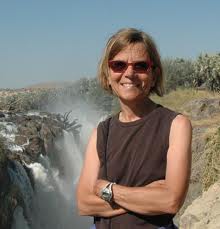A few good friends

Chimpanzees grooming each other. Image courtesy Samantha Russak.
Do humans form closer relationships as we age, understanding the inevitably of our own mortality? Socioemotional selectivity theory (SST) tries to explain this behavior in experimental findings from examples in mostly Western societies.
Writing in the journal Science this week, ASU Regents Professor Joan Silk brings her years of research on social behavior in primates to bear in "The upside of aging," a commentary on a paper by Rosati et al. The paper is testing if this pattern of forming close friendships as aging occurs extends to other primates who do not understand the concept of time or have the capacity to anticipate future events. The research examined age-related changes in relationship quality among male chimpanzees.
Silk’s most recent research has been in examining how female baboons form close relationships, and she has observed both baboons and chimpanzees in the wild. Silk is a research affiliate with the Institute of Human Origins and a professor with the School of Human Evolution and Social Change.
Because males remain in the communities in which they are born, long-term observations can be made of chimpanzees in these communities across their long lives together.

Joan Silk
Silk notes that the paper provides convincing evidence that male chimpanzees behave much like humans do as we age, and this pattern might exist in other primates as well.
Thus, she writes, “the patterns that SST was created to explain appear to generalize beyond our own species and might not depend on having a well-developed concept of time or conscious awareness of mortality.”
As rates of aggression decline with age, there are shifts in the males’ emotional reactivity. Essentially, the male chimpanzees mellow out, so their behavior doesn’t have to focus on dominance behaviors of earlier periods.
In the final analysis, Silk writes, “An evolutionary perspective can provide valuable insights into how natural selection shapes human social behavioral strategies as we grow old.”
More Science and technology

A new chapter in national security research at ASU
In 1957, the Soviet Union launched Sputnik, the world’s first artificial satellite, into a low orbit around the Earth. Only the…

One ASU researcher’s fix for freight’s costliest miles
America’s freight system is a miracle of modern logistics — until it isn’t. One snowstorm, one labor shortage, one delayed…

ASU to help Arizona Army installation improve energy, lower costs
In a move that will support resilient energy systems in the places that keep our nation safe, Arizona State University signed a…